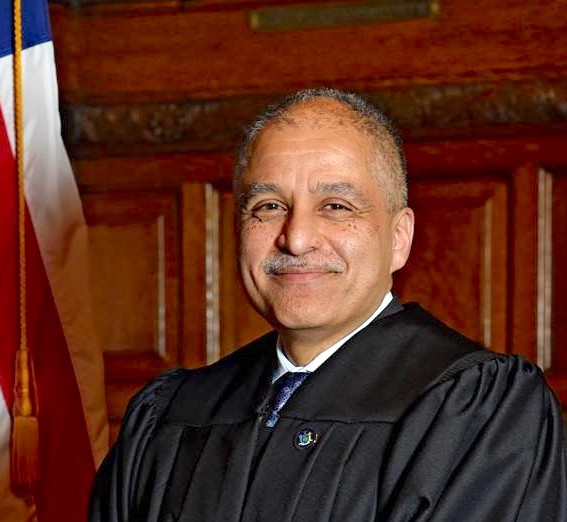BY THE VILLAGE SUN | Updated April 11, 1:30 a.m.: Governor Hochul has nominated Rowan Wilson to be the chief judge of the New York State Court of Appeals, the state’s highest court. This follows the state Senate in February slapping down her previous nominee, Hector LaSalle, who progressive Democrats felt was too conservative.
Among those leading the charge against LaSalle was state Senator Brad Hoylman-Sigal, chairperson of the Senate Judiciary Committee.
Wilson’s name is familiar to East River Park activists. It was Wilson’s Court of Appeals that, in December 2021, in the last gasp of Bill de Blasio’s mayoralty, tossed out a legal appeal to the East Side Coastal Resiliency project, plus ruled there was no stay in effect to prevent the park-razing, $1.45 billion megaproject from going forward. (See The Village Sun article “Judge named for a tree chops down legal challenges to East River Park resiliency project.”)
Not even waiting for the court to issue his ruling the following week, though, de Blasio preemptively green-lighted hard hats to start chainsawing down the park’s trees around the clock on a weekend.
The “park alienation” lawsuit argued that the state Legislature needed to vote on whether to allow the 50-acre park to be removed from public use for years during the reconstruction. The litigation was brought on behalf of East River Park ACTION and others by Greenwich Village activist attorney Arthur Schwartz, with former Councilmember Kathryn Freed as co-counsel.
The terse decision, just a few short sentences, written by Wilson, knocked the lawsuit’s arguments as “academic.”
“We lost,” Freed said, dejectedly, after the ruling by Wilson’s appeals court. “And they didn’t even give an explanation. Usually, they do. We brought up a question of law. So they either didn’t want to deal with it or they don’t think it’s a matter of law or they might have decided it’s just a bit of a mess and they just avoided the whole thing.”
However, speaking this week, Freed, who is herself a retired State Supreme Court judge, said she doesn’t blame Wilson personally for the decision, noting she had referred to “they” in her original comment. Wilson was simply the judge who “got the motion” on the lawsuit, meaning he was the Court of Appeals’ point person on it, so he was the one who signed the decision.
“He seemed to be willing to give us a chance because he signed the order to show cause to allow us to show that we had a case,” she said, “and then [signed] an order for the city to show cause that they weren’t in contempt of his earlier order. … But obviously, there was no support on the Court of Appeals. You need four judges for there to be a reversal.”
Basically, Freed said, the suspicion was that political pressure was brought to bear on the court, whose members leaned conservative, with Wilson being one of its only two progressive members.
In a statement, Hoylman-Sigal said, “Associate Judge Rowan Wilson is an accomplished and well-respected jurist on the Court of Appeals, with a long and distinguished record in the private sector. … The importance of…nominees to New York’s highest court cannot be overstated, especially given recent decisions by federal courts on issues such as abortion, gun safety, labor and the environment.”
The state senator said he looks forward to conducting “fair and thorough hearings” to examine Rowan’s record.
For the past six years Wilson has served as an associate judge on the Court of Appeals
“The chief judge of the Court of Appeals not only leads the state’s highest court,” Hochul said, “but is also responsible for managing the diverse and complex courts across the state. New Yorkers deserve a strong, effective and thoughtful leader, and I am proud to nominate Judge Wilson as chief judge. Judge Wilson’s sterling record of upholding justice and fairness makes him well suited to lead the court at this critical time.”
If confirmed, Wilson would be the Empire State’s first Black chief judge.
He grew up in Berkeley, California, and received his undergraduate degree from Harvard College, going on to Harvard Law School. After law school, Wilson clerked for James Browning, chief judge of the U.S. Court of Appeals for the Ninth Circuit.
He then joined Cravath, Swaine & Moore as an associate, becoming in 1992 the first Black partner in the prestigious New York City law firm’s history. In private practice, Wilson handled numerous corporate and pro bono matters. He also served as trustee for the Lawyers Committee for Civil Rights Under Law and for the National Center for Law and Economic Justice, and for 21 years as chairperson of the Neighborhood Defender Service of Harlem, which provides legal representation and community-based public defense services to the Harlem community.
“Serving as chief judge of the Court of Appeals would be the honor of my career, and I am humbled by this nomination from Governor,” Wilson said. “Protecting the rights of New Yorkers is my top priority, and I look forward to working with Governor Hochul and our partners throughout the judiciary system to manage our courts and deliver justice.”
The New York Court of Appeals was established in 1847. Previously, the voting public had partial or full input on the composition of the state’s highest court: For its first 20 years, half the court’s judges were elected and half appointed by the governor from among the justices of the state Supreme Court. The Constitutional Convention of 1867-68 set the court’s number of judges at seven, and from then until 1977, in fact, all of the high court’s judges were chosen by statewide elections. In 1977, however, the State Constitution was amended to create a Commission on Judicial Nomination to recommend candidates to the governor for appointment to the Court of Appeals, on the advice and consent of the state Senate.


Be First to Comment